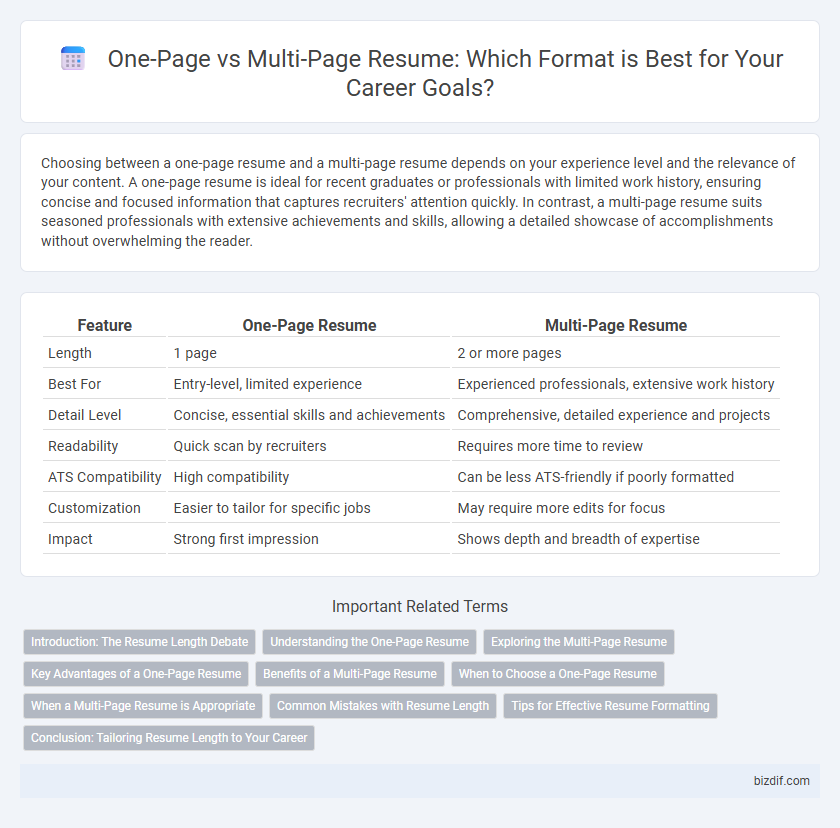Choosing between a one-page resume and a multi-page resume depends on your experience level and the relevance of your content. A one-page resume is ideal for recent graduates or professionals with limited work history, ensuring concise and focused information that captures recruiters' attention quickly. In contrast, a multi-page resume suits seasoned professionals with extensive achievements and skills, allowing a detailed showcase of accomplishments without overwhelming the reader.
Table of Comparison
| Feature | One-Page Resume | Multi-Page Resume |
|---|---|---|
| Length | 1 page | 2 or more pages |
| Best For | Entry-level, limited experience | Experienced professionals, extensive work history |
| Detail Level | Concise, essential skills and achievements | Comprehensive, detailed experience and projects |
| Readability | Quick scan by recruiters | Requires more time to review |
| ATS Compatibility | High compatibility | Can be less ATS-friendly if poorly formatted |
| Customization | Easier to tailor for specific jobs | May require more edits for focus |
| Impact | Strong first impression | Shows depth and breadth of expertise |
Introduction: The Resume Length Debate
The debate between one-page and multi-page resumes centers on balancing brevity with detail to effectively showcase qualifications. A one-page resume emphasizes concise, targeted information ideal for early-career professionals or positions requiring quick screening. Multi-page resumes accommodate extensive experience, detailed accomplishments, and complex career histories commonly needed in senior or specialized roles.
Understanding the One-Page Resume
A one-page resume emphasizes clarity and conciseness, highlighting key skills and achievements to capture recruiters' attention quickly. This format is ideal for early-career professionals or those with limited work experience, ensuring the most relevant information is presented without overwhelming the reader. Employers often prefer one-page resumes for initial screenings because they streamline the hiring process and improve readability.
Exploring the Multi-Page Resume
A multi-page resume allows for a comprehensive presentation of extensive work experience, detailed project descriptions, and numerous professional accomplishments, making it ideal for senior-level professionals or those with diverse qualifications. It provides ample space to highlight specialized skills, certifications, and publications that may be relevant to the targeted role. Employers in technical, academic, or executive fields often prefer multi-page resumes to assess a candidate's depth of expertise and career trajectory.
Key Advantages of a One-Page Resume
A one-page resume offers concise presentation, allowing recruiters to quickly scan key skills and experiences, enhancing initial impressions and increasing interview opportunities. It emphasizes relevance by forcing candidates to prioritize their most impactful achievements, making it ideal for professionals with less than 10 years of experience or those changing careers. This focused format improves readability and ensures ATS (Applicant Tracking System) compatibility, boosting the chances of passing automated screenings.
Benefits of a Multi-Page Resume
A multi-page resume allows for a more comprehensive presentation of work experience, skills, and accomplishments, enabling candidates to showcase detailed project outcomes and leadership roles effectively. It is ideal for professionals with extensive career histories, technical expertise, or those applying for senior-level positions requiring in-depth expertise. Recruiters can gain a deeper understanding of the candidate's qualifications, making it easier to assess fit for complex or multifaceted roles.
When to Choose a One-Page Resume
A one-page resume is ideal for early-career professionals or candidates with less than 10 years of experience, as it forces concise presentation of key skills and achievements relevant to the job. It suits industries favoring brevity, such as marketing, tech startups, and retail, where hiring managers prefer quick, impactful summaries. Use a one-page format when applying to positions that emphasize clarity and efficiency, ensuring all critical information fits without overwhelming the reader.
When a Multi-Page Resume is Appropriate
A multi-page resume is appropriate for professionals with extensive experience, such as senior executives, academics, or individuals with a diverse skill set requiring detailed project descriptions, certifications, and publications. Employers in industries like academia, research, or senior management often expect comprehensive documentation outlining achievements and career progression over multiple pages. Including quantifiable accomplishments and relevant keywords on each page enhances applicant tracking system (ATS) compatibility and ensures crucial information is highlighted effectively.
Common Mistakes with Resume Length
Common mistakes in resume length include overcrowding a one-page resume with excessive details, making it difficult to read and reducing impact. Conversely, multi-page resumes often suffer from redundant information or irrelevant content, which can overwhelm recruiters. Tailoring resume length to highlight key skills and achievements concisely enhances clarity and effectiveness.
Tips for Effective Resume Formatting
A one-page resume is ideal for early-career professionals or those with limited work experience, emphasizing concise and relevant information. Multi-page resumes suit seasoned professionals with extensive achievements, allowing detailed descriptions of skills, projects, and roles. Use clear headings, bullet points, and consistent font styles to enhance readability and prioritize key accomplishments for maximum impact.
Conclusion: Tailoring Resume Length to Your Career
Choosing between a one-page resume and a multi-page resume depends on your career stage and industry standards. Entry-level professionals or those with less than 10 years of experience typically benefit from a concise one-page format that highlights key achievements and skills. Seasoned professionals, executives, or individuals with extensive experience and diverse accomplishments should consider multi-page resumes to comprehensively showcase their expertise.
One-Page Resume vs Multi-Page Resume Infographic

 bizdif.com
bizdif.com